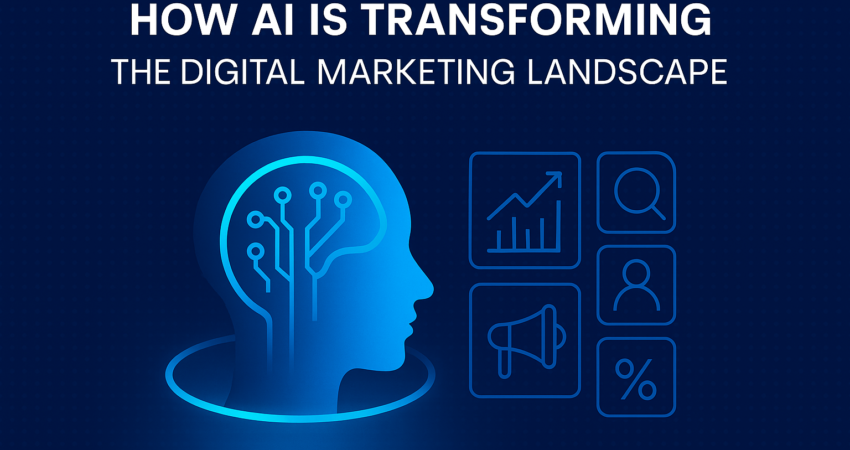In recent years, Artificial Intelligence (AI) has evolved from a futuristic concept into a practical, everyday tool—and nowhere is its impact more visible than in the world of digital marketing. AI is reshaping the way brands interact with consumers, optimize campaigns, and analyze performance, ushering in a new era of smarter, faster, and more personalized marketing.
Whether you’re a business owner, a marketer, or a curious observer of tech trends, understanding how AI is changing the digital marketing landscape is no longer optional—it’s essential.
1. Personalization Like Never Before
Gone are the days when businesses could rely on one-size-fits-all messaging. Today’s consumers expect personalization—and not just in emails that include their first name. They want recommendations based on their behavior, ads that reflect their interests, and experiences tailored to their journey.
AI enables this level of personalization by analyzing data at scale. It looks at browsing history, purchase behavior, social media activity, and more to create highly specific customer profiles. Marketers can then serve customized content, offers, and product suggestions with remarkable precision.
This creates more engaging experiences, boosts conversion rates, and fosters brand loyalty. For consumers, it feels like the brand “gets” them—for businesses, it means higher ROI.
2. Smarter Content Creation
Creating compelling content is still at the heart of digital marketing. However, AI is helping to streamline and enhance this process. Tools powered by machine learning can now suggest blog topics, generate drafts, and even adapt writing style to suit different audiences.
While AI can’t fully replace human creativity, it significantly reduces the time spent on research, writing, and editing. It can also predict which types of content are likely to perform well based on trends and user behavior.
This combination of automation and insight allows marketers to focus more on storytelling and strategy, rather than getting bogged down in repetitive tasks.
3. Enhanced Ad Targeting and Performance
AI has revolutionized how online advertising works. Traditional ad targeting involved selecting broad demographics and hoping for the best. AI, on the other hand, analyzes massive datasets in real time to refine targeting down to specific interests, behaviors, and purchase intent.
Platforms like Google Ads and Meta Ads use machine learning algorithms to continuously test and optimize campaigns. They automatically adjust bids, choose the best-performing creatives, and even decide when and where to show ads.
This results in higher click-through rates, better engagement, and lower costs—without constant manual intervention.
4. Predictive Analytics for Better Decisions
Another powerful capability of AI is its ability to predict future outcomes. Using past behavior and current trends, AI models can forecast everything from what time of day your users are most likely to convert, to which product a visitor might buy next.
Marketers can use this information to make proactive decisions. For example, instead of reacting to declining sales, a brand can spot the trend early and change its campaign strategy.
This is especially helpful for agencies offering digital marketing services, as it allows them to deliver not only creativity but also tangible, data-driven results that align with their clients’ business goals.
5. Voice and Visual Search Are on the Rise
AI is also behind the growing popularity of voice and visual search. With the rise of voice assistants like Alexa and Google Assistant, more people are searching using natural language rather than typed keywords. At the same time, tools like Google Lens allow users to search using images instead of words.
This shift changes how marketers approach SEO. It requires a deeper understanding of context, conversational queries, and image optimization. AI helps in analyzing these new search behaviors and adjusting strategies accordingly.
Early adopters of voice and visual search optimization are likely to gain a significant competitive edge in the coming years.
6. Chatbots and AI-Powered Customer Service
Customer service has traditionally been resource-intensive. AI-powered chatbots now handle many of these interactions quickly and efficiently. They’re available 24/7, never get tired, and can handle thousands of conversations simultaneously.
But today’s chatbots are more than just automated FAQ responders. With natural language processing (NLP), they understand tone, intent, and even sarcasm. Some are even capable of escalating complex issues to human agents at the right time.
The result is faster response times, reduced operational costs, and a better overall customer experience—especially for e-commerce and service-based businesses.
7. Automation That Saves Time and Money
AI doesn’t just analyze and predict—it also automates. From scheduling social media posts to sending personalized emails at the perfect time, AI helps marketers do more with less.
Campaign management platforms now come with built-in AI tools that suggest optimal posting times, detect the best-performing hashtags, and even A/B test different variations of ads or subject lines automatically.
This kind of automation reduces human error, improves efficiency, and frees up teams to focus on creative and strategic thinking.
8. Data-Driven Insights in Real Time
One of the most valuable contributions of AI is real-time data analysis. Rather than waiting days or weeks to assess a campaign’s performance, marketers can now get instant feedback. AI tools can highlight trends, detect anomalies, and suggest course corrections on the fly.
This enables quick pivots, which is especially useful in fast-moving markets. It also helps avoid budget wastage by identifying underperforming ads or ineffective strategies early in the process.
For growing businesses, having access to real-time insights levels the playing field and allows them to compete with larger, more established brands.
Conclusion: A Smarter Future for Marketers
Artificial Intelligence is no longer a futuristic add-on—it’s a foundational element of modern digital marketing. Its ability to personalize content, predict behavior, automate processes, and provide real-time insights is transforming how businesses connect with their audiences.
But AI isn’t replacing marketers—it’s empowering them. It enhances human creativity, supports smarter decision-making, and delivers measurable value at every stage of the customer journey.
For businesses that want to stay ahead, integrating AI into their marketing efforts is not just a competitive advantage—it’s a necessity.






